- Home
- Michael White
Bob the Balloon, Al Capone and the Two Bob Bouncer Page 2
Bob the Balloon, Al Capone and the Two Bob Bouncer Read online
Page 2
That last day we were all working on a dirty cargo set for the Dunlop works. We called it carbon black, or just, “the black”. You would get a special pay rate for handling it, though God only knows what it did to us. It wouldn’t happen now. Health and safety would have a bloody fit. Anyhow, we are all down in the hold as the stuff was hauled up over the dock and into wagons parked on the quayside. It was dirty, hard work and we were all exhausted. Once we were done one by one the gang made their way back to the dock. I was fair knackered, covered from head to foot in this bloody awful black stuff, and was slower to make my way up than most of the others. We all looked as if we had been working down a bloody mine! I was slumped against a packing case trying to raise some energy to move when I realised that there was only me and The Two Bob Bouncer left. I had to laugh. He was about to retire and he looked as if he had more energy left in him than the rest of us put together! Certainly more than me, anyway! He was standing on a packing case on the other side of the hold, looking up at the bright sunlight shining through from up above. He too was black from head to foot, and he seemed lost in his thoughts.
“Why are you so interested in why they call me The Two Bob Bouncer?” he suddenly said. He was not even looking at me. As I replied the sun hit him from up above until he looked like some kind of huge statue made of black stone.
“Just being nosey, like.” I said defensively, and still without looking at me he grinned at that.
“Fifty years on the dock.” he whispered, and it was almost as if he was talking to himself. “Where did it go?” Then he seemed to come to a decision.
“Have you got two Bob on you?” He asked. Still looking up at the sun. Two Bob was a fair old bit of money back then, though. That’s two shillings to you. He must have read my mind. “Don’t worry. You’ll get it back.” and I noticed that he pulled a two Bob bit out of his pocket. I did the same. Wondering what he wanted another one for.
“Catch.” I said, and threw it at him even though he wasn’t even looking at me. He was still gazing up at the sun, the other two Bob bit in his hand. Without looking he caught it with his other hand easily. Somehow I knew he would.
“This.” he said, turning to face me now, the pair of us alone in the hold, both as black as the ace of spades. Him standing on top of the crate, the sun pouring down from above.
“This is why they call me The Two Bob Bouncer.” And he threw both of the coins high into the air. They sparkled in the sunlight before they slowly fell back down and he caught both of them on the back of his hands. Then he started to move them from knuckle to knuckle, flipping them across the back of his fingers in each hand. When they got to the end he flicked them back to the start and began again. Both hands at the same time. It was an amazing thing to watch. Then he began to get faster, the coins almost a blur now, moving rapidly across the back of his hands, tumbling, bouncing from finger to finger. Flick. Back again. Faster. Flick. Faster still. Until the coins became a silver blur, and all the time he smiled. Never even looked at them. Just smiling at me. Faster still. Then the coins danced. After a minute or so as I stood mesmerised he gave them a final flick and both of the coins flew into the air and he caught them. Threw one back to me.
“That was amazing.” I began to stutter, but The Two Bob Bouncer was already down off the crate and on his way out of the hold. I just stood there stunned as silence fell all around me. I eventually too headed up to leave, but by the time I had got my stuff together The Two Bob Bouncer had already gone.
Do you know that was some forty years ago, and I swear I’ll never forget those coins flying across his hands. It was like a miracle. As if they had defied the law of gravity or some such thing. Even now, so many years later I can still see him in mind. As if it was yesterday. Tall as a statue up on the crate, bathed in sunlight, coins flying across the backs of his hands as he just stood there and smiled.
But do you know the strangest bit? I have never told anyone before about it. Why The Two Bob Bouncer was called that. Sad really, if anyone other than me remembers him they have no clue why he was called that at all. Or at least that’s what I think. Mind you. I don’t suppose anyone would believe me, to be honest.
But there you go. You heard it here first.
Her follow a couple of extracts from several of the stories in the “Liverpool” collection, as well as several other from my previous book of short stories, “Paul McCartney’s Coat and Other Stories” as well as a few bits from other standalone stories. If you are sufficiently intrigued to want to buy one or two then all of my titles can be found on my Amazon author pages, on:
http://www.amazon.co.uk/-/e/B006Y7JHCK
First of all, let’s start with samples from “Liverpool”.
Liverpool
(Excerpts)
The Strange Case of the Toff’s Policeman
And the Curious Elm.
I have done my fair share of nights. It is worked on a shift basis, one week in four. It is worse a night shift in the winter as the park is a cold and bleak place. Wide open and completely deserted. Not a place for one hindered with a good imagination, I would say. The park of a night can be a beautiful but also a terrifying place when there is no form of illumination at all. All you could hope for was a starry night at best. Though we were all equipped with a torch, of course. Yes, a torch and a whistle, which would come in especially useful for the ritual that was the locking of the park gates. This always takes place exactly one hour after sunset. The gates are of course so far apart that it is quite impossible to be able to communicate with the constables locking the other entrances. Yet the Sergeant is a stickler for it. The gates must be locked at exactly the right time. So this is when our whistles come in especially useful. We would give a long burst on the whistle, about thirty seconds or so which is then responded to by your colleague at the next gate, and so forth. Somewhat like a chain of beacons being lit in days of old, I dare imagine! Then the gates are locked for the night and the Parks Police night shift takes over.
It is quite a popular ritual in Liverpool, is the locking of the park gates. Some people mark the beginning of night in Liverpool by the sound of the constable’s whistles, I believe. Some folk even gather to watch from time to time, and even every now and again some of the wealthier families and perhaps a guest or two. If this is the case I often make a show of it and give a small salute to the people there when done. Always seems to mark the end of a shift nicely, does that. Then it’s off home. Unless it is a night shift, of course, and it is at that juncture that your shift is beginning. As I have noted earlier, the night shift is not my favourite shift. For all sorts of reasons. What I am about to tell you however was most certainly the most unusual yet fascinating night shift of all. It was very probably the most frightening as well. “
The Lipstick Girls
My name is Sheila Teresa Roberts and I’m a lipstick girl. Or at least that’s what some people call me. Others can be just a bit more brutal. To hell with them, I say, though I would say it quietly, and perhaps under my breath because believe it or not, I was brought up to be, and am, a good Catholic girl. I work in the big fancy department store in Liverpool. Not the one with the statue above the door where it seems like everyone in town decides to meet. The other one. The posh one. I’ve worked there for nearly thirty years now. Always on the makeup and perfume department. It kind of suited me really, and even though I’m not one to bang my own drum I’d say I’m still a bit of a looker. Still got it. Helps with the job. No doubt about that. More than a few wrinkles perhaps, but presentable. Yes, presentable. That’s me. Sheila Teresa Roberts, the presentable lipstick girl.
The Last Bomb, Aloise's Café and
Death by Cow.
The last bomb that fell on Liverpool in the Second World War fell on the evening of the tenth of January nineteen forty two in amongst other places, Upper Stanhope Street, Toxteth. I know this for I was there at the time, and remember it well.
You would have thought we had grown used to the seemingly endless series of
bombings by then, but I think that we never really had. Of course, we did not know at that time that it was the last bombing raid. As far as we knew it would carry on forever. We were not to know, but that was the last night and that was more than enough. I left the air raid shelter as the all clear was sounded and found myself in hell. Whole streets were now reduced to mounds of burning rubble. I could not reconcile my position in the sense that what I now saw did not match with what I had briefly glimpsed as I had hurriedly entered the shelter hours before when the sirens had begun to sound. The skyline was in flames. Smoke floated in eerie clouds across wide open spaces that hours ago had been houses, businesses. They were now just piles of concrete, metal and glass shattered across the ground.
The Ghost Next Door
Me dad use to say that in Liverpool there was always a ghost next door. As a kid I spent many a dark night huddled under the covers in case the ghost from next door decided it liked our house better, because we didn’t seem to have our own ghost so there must definitely be one at number eleven. But as I grew up I began to realise that what he had really meant was that Liverpool as a city was full of stories about ghosts. Scousers love stories, of course, and if they include a ghost or something unexplained happening, all the better. I suppose it's that mix of Irish and Welsh as well as God knows what else. It just seems to invite tall tales.
Dad even had a tale of his own. When he was a kid him and his mates used to play down by Garston docks and there was an abandoned warehouse there that was pretty much just bits of roof left with no walls at all. Just a few metal beams holding what was left of the roof up. Bloody health and safety would have a fit at the thought of kids being able to knock about there these days, but when me dad was a kid that was where they used to play. There was even a little watchman's hut there that was more or less still intact even though it hadn't been used for years and one day they were all playing there when the watchman turned up, and waving at them he went into the hut. Now they all thought that this was a bit odd because, as I say, there was nothing for him to actually watch over any more and after a while they plucked up courage to go and knock on the door to the small shed and ask him what he thought he was doing.
I imagine you probably know where this is heading, because of course when they finally got fed up of knocking on the hut door and opened it the small shed was completely empty. In fact, it looked as if it had been empty for years. There was no other way out of there and they hadn't taken their eyes off it since the old bloke had arrived. Needless to say, they got out of there pretty quick!
So you see, everyone in Liverpool has a ghost story to tell. Everyone seems to have a favourite one, and sometimes they grow in the telling. It would be fair to say that most of them are complete nonsense, but then you never know. You just never know. That's the hook.
Paul McCartney’s Coat and Other Stories
(Excerpts)
Paul McCartney’s Coat
Old Todd was a right old card - I’ve never met a bloke before or since who was more up for a laugh, I can tell you! But now he’s gone and passed over I can tell you a secret he told me years ago, and as far as I know, I think probably it’s only him and me that knows all about it. Course, he ain’t telling now so it’s up to me. This is what he did.
Best place to start would be with the music. Todd was a bugger for it. Rock and roll, pop. Strictly sixties stuff. None of this bloody head banging boom boom boom that seems to be all you can get these days. No idea what’s going on in kid’s heads listening to that kind of crap! Gives me a right old headache, it does. No, for Todd It had to be sixties music. Golden age, he called it, and he had no shift at all with anything that came after that. Used to get misty eyed about it, he did. Yeah, music was his thing, and he had a particular soft spot for the Beatles. He knew all the tunes, had all the albums. This was back in the days when they were proper albums you had to put on a turntable to play , and if he’d had a few he would sing along to all of their songs, word perfect. Not note perfect, I’d say! But that was Todd for you, though. Dead keen on the songs even if he couldn’t carry a tune in a bucket!
Went to all the concerts too, he did. Not for the Beatles like, they hadn’t been in front of an audience for at least a year, and even that was in America. Nice work if you can get as far as I can see, but he said he remembered the early days and he had seen them once or twice back then. I think the way he looked at it was once they got popular you couldn’t even hear then playing because of the God awful row of all the girls screaming at them. Pretty much ruined it for Todd did that. Course it looks like it ruined it for them as well!
So Todd was a big fan. He didn’t have the bloody Beatles wigs and what have you, but he had all of their albums, all their singles. It looked like he couldn’t have been a bigger fan. Well, on the music side, anyway.
All that changed though, on the day that he found Paul McCartney’s coat.
An Inspector Calls
From the corner of Hesketh Street to the tree lined lane that wound its way towards Grantham's Walk is a swift passage of not more than say, five minutes. Generally a pleasant walk, with trees just the right height waving in the breeze, the traffic here is neither too heavy nor too light. In general suburban terms it could be said that it was pretty much an idyllic area. The houses are generally well moneyed, and if the general area could be said to have any problem whatsoever (and it had to be a little bit of nit - picking, it has to be said), it was a small problem. If a problem at all. If forced to express a derogatory opinion, the general consensus would be that the area was just a little too middle class; a little bit well, twee.
Which in itself is not really any kind of problem at all. If the worst offence that an erring politician could summon was that he was in most opinions, decidedly middle class, or that the military dictator whose latest grand plan involved a lot of: a) drugs, b) lots of money, and c) a certain amount of neat plutonium sitting around doing nothing much at all somewhere in the general area of the Ukraine, (and not necessarily in that order), and if the worst that could be said of such a dictator was that he was, when all was said and done, a little bit, well...twee... then the world would most certainly be a much better place. There would certainly be a lot more Ikea stores, for certain.
So, when all is said and one, not a bad area. The trees were nice. The way the sun set just above the crest of the hill as it climbed back towards the town (Strictly May to August - the locals banked on it), all is pretty much as it should have been. Even the lampposts - evenly spaced, cast iron (very old school), were pretty much pillars of good taste.
Down the hill, towards Cressington Gardens, across the small green and there is the village pub. Much has been written about the place of the modern public house in the role of the community, and much has taken place over the last number of decades to change the role of such a building in society. Amongst other things, the advent of the cheap family car, the rise of the out of town shopping centre, the lures used by the modern public house were many. Cheap food and play areas for the family. Dusty the Clown party bags and endless variations of Pizza and chicken nuggets for the kids. The traps were set, and the public fell into them. So the way went, and so the pub - centre of the community, excluder of children, most women and those financially embarrassed - changed. Or most did.
Charles Horse, licensee, proprietor and landlord (his preferred title), of the Bucket and Shovel public house thought that all of this, of course, was complete and utter bullshit. Not for him the modern pub with Sunday lunch for eight pounds, the quiz night on a Monday and Wednesday. No Siree, Charlie ran a traditional public house, and that meant darts, pool, a nineteen sixties / country and western music jukebox and no food whatsoever. (Apart of course from crisps, nuts, pork scratching’s and pickled eggs. But they of course, don't really count. (Particularly the pork scratching’s and pickled eggs)). As well as these treats there was always fresh sawdust in the bar once a week (whether it was needed or not), tournaments on a rolling basis for darts
, pool and a Race night every last Thursday in the month. Charlie believed in the old values. The good old values. And not necessarily family ones, either.
From the outside, the pub looked like any other. This was of frequent embarrassment to carloads of distressed parents on sunny summer afternoons. Keen to offload the kids into the nearest play area, stuff themselves with a good old fashioned pub-produced Sunday roast and the kids with either pizza or chicken nuggets, entering into the Bucket and Shovel could be a salutary experience.
"Excuse me", would stammer a travelling parent, car still outside from where the sound of raucous children could just be heard, "Do you serve Sunday lunch?"
Such a question posed to Charlie would inevitably lead to a smug grin that didn't so much spread across his face as burst its banks and threaten to flood the entire local area.
"Food?" would boom Charlie, pausing to lift a glass from above the bar and polish it with his Cellar man’s apron, "Nah," he would pronounce, and that was it. The potential customer would usually stand there waiting for the next bit of the conversation, but it never actually arrived. No directions to the nearest pub that did sell food, no advice on the best route to take; nothing at all, really. Which would inevitably lead to a small-embarrassed silence, and the eventual departure of the slightly disgruntled, if not confused, customer.
Which most entrepreneurs involved in the management of small businesses would find most odd. But that was the thing with Charlie. It was not that he didn't want to serve customers, or that he did not want to make a decent living. Few people would come to the conclusion after examining Charlie's behaviour that he would love to run a chain of pubs. Simply put, he did. It was his dream. But all of his day dream pubs would be run on the same principles. No food. No kids. No play areas - and definitely no designer beers or wine of the month.

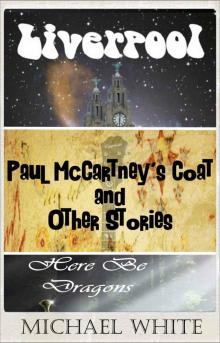 Paul McCartney's Coat
Paul McCartney's Coat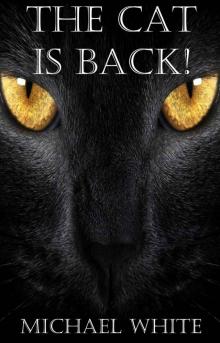 The Cat Is Back!
The Cat Is Back!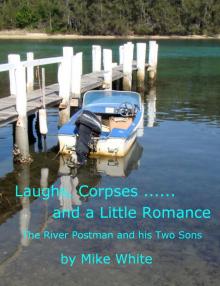 Laughs, Corpses... and a Little Romance
Laughs, Corpses... and a Little Romance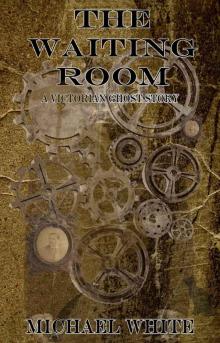 The Waiting Room
The Waiting Room Into the Light- Lost in Translation
Into the Light- Lost in Translation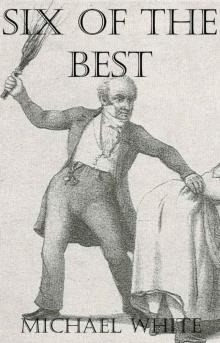 Six of the Best
Six of the Best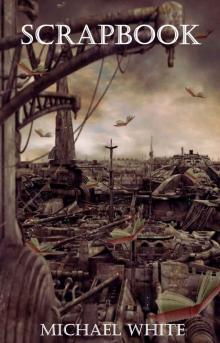 Scrapbook
Scrapbook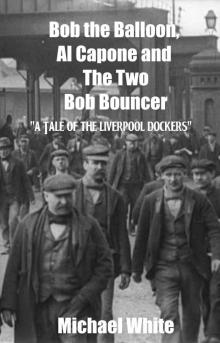 Bob the Balloon, Al Capone and the Two Bob Bouncer
Bob the Balloon, Al Capone and the Two Bob Bouncer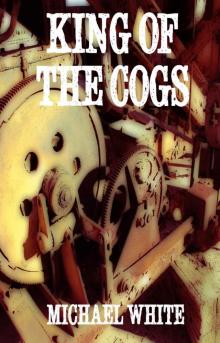 The King of the Cogs
The King of the Cogs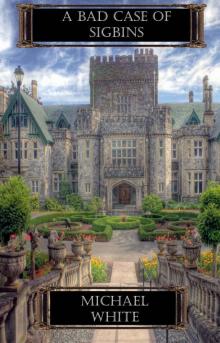 A Bad Case of Sigbins
A Bad Case of Sigbins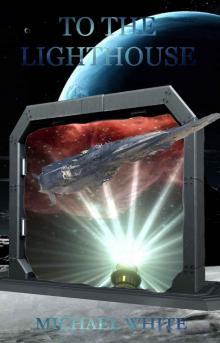 To the Lighthouse
To the Lighthouse Overboard!
Overboard!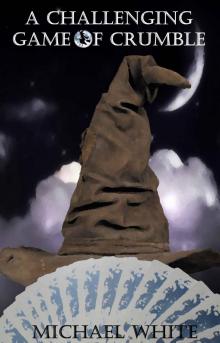 A Challenging Game of Crumble
A Challenging Game of Crumble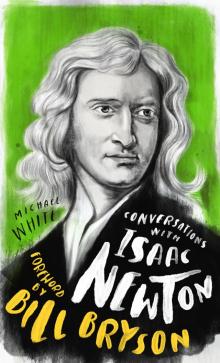 Conversations With Isaac Newton
Conversations With Isaac Newton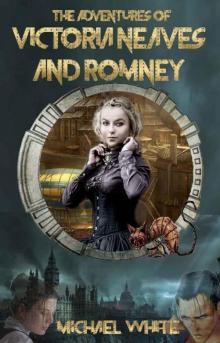 The Complete Adventures of Victoria Neaves & Romney
The Complete Adventures of Victoria Neaves & Romney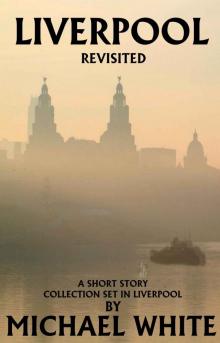 Liverpool Revisited
Liverpool Revisited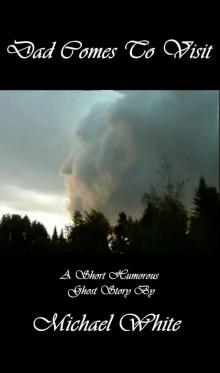 Dad Comes to Visit
Dad Comes to Visit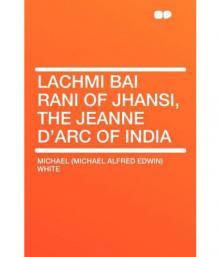 Lachmi Bai, Rani of Jhansi: The Jeanne D'Arc of India
Lachmi Bai, Rani of Jhansi: The Jeanne D'Arc of India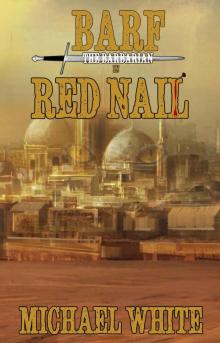 Barf the Barbarian in Red Nail (The Chronicles of Barf the Barbarian Book 2)
Barf the Barbarian in Red Nail (The Chronicles of Barf the Barbarian Book 2)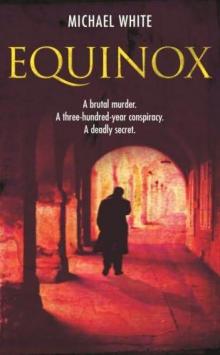 Equinox
Equinox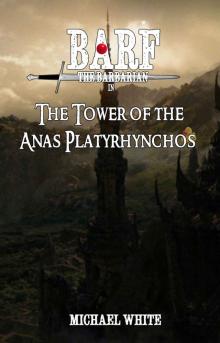 Barf the Barbarian in The Tower of the Anas Platyrhynchos (The Chronicles of Barf the Barbarian Book 1)
Barf the Barbarian in The Tower of the Anas Platyrhynchos (The Chronicles of Barf the Barbarian Book 1)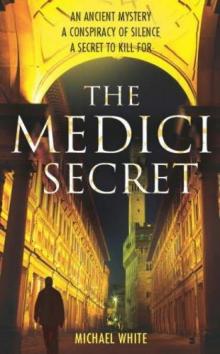 The Medici secret
The Medici secret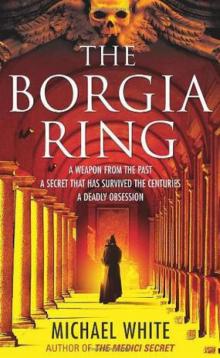 Jack Pendragon - 02 - Borgia Ring
Jack Pendragon - 02 - Borgia Ring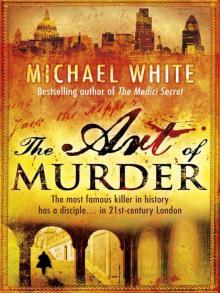 The Art of Murder jp-3
The Art of Murder jp-3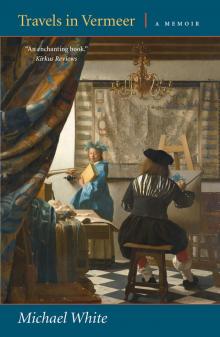 Travels in Vermeer
Travels in Vermeer